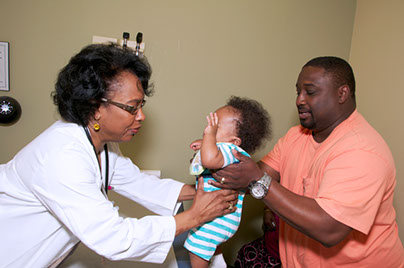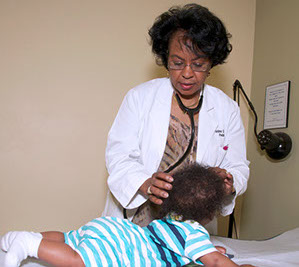
The simple solution to the worldwide problem of obesity is proper nutrition and exercise. Unfortunately, this remedy is often passed up, in favor of “fast living” in an age where children are “over-gadgeted” and parents are distracted by “their things.” So says Dr. Geraldine Chaney, Mississippi’s first African American pediatrician in private practice.
“Back in the day, we all ate from the earth,” Dr. Chaney recalls as she discusses her work and activities between appointments. Back then, gardens were the norm, and children and families worked in them. They prepared nutritious food from them. It was then, when Dr. Chaney rarely saw serious childhood illnesses. In those days, parents brought in their infants and children mostly for wellness visits. Those were the days when the physician and the parents chatted a lot about strategies to keep the young ones healthy.
 “Thirty years ago, I saw very little obesity in children,” Dr. Chaney shakes her head. “Today, obesity is the number one health issue. It is the gateway to diabetes, heart disease, cancer and hypertension, especially in children.” In response to her concern for children, Dr. Chaney has worked within professional healthcare and community organizations as well as with state and national agencies for the sake of children. She believes much of the work has been done with public and private sectors. Now, it’s time to work directly with parents, churches and in the home.
“Thirty years ago, I saw very little obesity in children,” Dr. Chaney shakes her head. “Today, obesity is the number one health issue. It is the gateway to diabetes, heart disease, cancer and hypertension, especially in children.” In response to her concern for children, Dr. Chaney has worked within professional healthcare and community organizations as well as with state and national agencies for the sake of children. She believes much of the work has been done with public and private sectors. Now, it’s time to work directly with parents, churches and in the home.
Just less than 50 years ago, parents relied heavily on religious institutions to help provide guidance in child raising.
“Our religious institutions really put the fear of God in parents, and they saw themselves responsible to teach, train and mold their children into people with a moral conscience,” Dr. Chaney reflects. “For a child to develop a moral conscience, they have to really believe there is a right and a wrong. I don’t see as many families today taking advantage of the religious institutions as a resource in raising their children.”
When parents relied on church guidance in rearing their children, they controlled what children did, including placing an emphasis on outdoor activities. Today’s parents are overworked and overstressed, often leaving children to themselves and creating a “no-win situation.” Dr. Chaney says fast food has “made it too easy” for parents to thwart their responsibility to prepare nutritious food. “Kids need to know how to prepare food and sit at a table to eat it,” the pediatrician says. “Parents are responsible for teaching them that.”
The best actions parents can take to fight obesity in young children is to see that children get outdoors for fresh air, exercise for at least an hour daily, and “eat controlled food portions.” The structure missing from many of today’s families could be mended somewhat just by reinstating the old-fashioned practice of eating together at the dinner table.
The dinner table had more significance than meets the eye, Dr. Chaney observes. “It used to be a learning source for parents and children. The only structure I see in many cases today is in the child going to school. What happened to the chores kids had to do?”
Although these issues are not resolved yet, Dr. Chaney speaks enthusiastically of the progress made in reducing childhood obesity by about 10 percent. She says First Lady Michelle Obama’s initiative to see healthier foods in school cafeterias made a big difference. Reports from cafeteria workers and other school personnel that children don’t like the healthier food are expected and will work out over time as children’s taste buds adapt to eating more nutritiously.
The victory in improving nutrition at school paves the way to improve it in other places, like home and community. “Now we need to work with parents, churches and the home,” says Chaney.
She believes a good step might be sponsoring innovative community forums with features such as chefs demonstrating the ease of healthy food preparation and giving parents grocery shopping tips like, “shop the periphery of stores,” since processed foods are displayed in the middle isles. The really good stuff –– fresh fruits and vegetables –– is found in the outer lanes.
Story and photos courtesy Hush Magazine
Dr. Geraldine Chaney, selected a “Best Doctor” in America (Redbook Magazine), worked more than 30 years as chief of pediatrics at St. Dominic’s Hospital and at Central Mississippi Medical Center (CMMC) in Jackson, Mississippi. The physician whose private practice spans 39 years currently runs her medical practice, Capital City Children and Adolescent Clinic, in Jackson, Mississippi. She also serves as a staff pediatrician at Baptist Medical Center and at CMMC, as well as an associate clinical professor at the University of Mississippi Medical Center. A graduate of the University of Mississippi School of Medicine, she received her undergraduate degree from Tougaloo College, where she recently was honored with the institution’s highest alumnus award (Meritorious Leadership Award). As a longtime advocate for children’s health and wellbeing, Dr. Chaney has connected with community organizations like The Links, Inc. and Jack and Jill of America; served on the boards of state, regional and national healthcare agencies; and promoted better health through speaking engagements on children’s healthcare issues for various entities.
